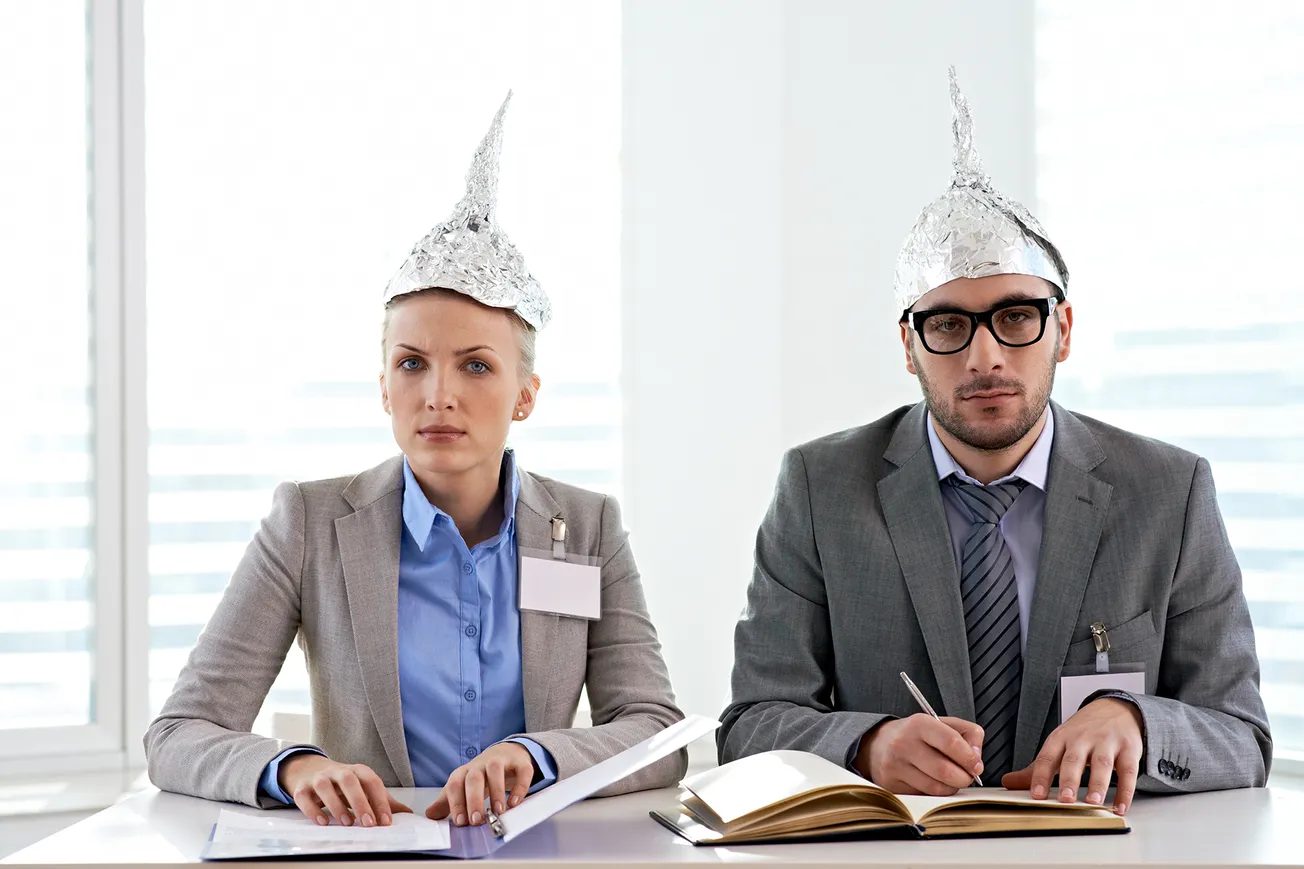Table of Contents
One of the most influential books on my teenage mind was Robert Anton Wilson and Robert Shea’s Illuminatus! (I’m in good company, as it happens: its mind-bogglingly psychedelic science-fiction satire was likewise a major influence on Bill Drummond and Jimmy Cauty, aka The JAMs/The KLF.)
Why did this book affect me so much? To be honest, as a young teenager, its unbridled libertinism was a heady brew, but as I got older, I imbued its satirical libertarianism. Most importantly, it pretty much permanently inoculated against uncritical belief in conspiracy theories. When you’ve seen everything from the Illuminati to the Kennedy assassination so mercilessly lampooned, scepticism comes naturally.
That’s not to say that real-life conspiracies never happen: of course they do. But real conspiracies, as opposed to the wilder fringes of conspiracy theory, are generally pretty dull stuff.
Widely appealing conspiracy theories demand formidable villains, bad guys who can keep a secret and who adroitly understand how the world works in order to seize the future.
Suffice to say that our real elites aren’t cut from such cunning cloth.
Our elites instead seem inept at understanding cause and effect. They are recurrently surprised that, for example, their depolicing drives lead to an explosion of riots, murders, and car crashes […]
I suspect that’s what real-world conspiracies are frequently like: desperate improvisations.
Conspiracy theories in the wild also differ from reality in that they’re not, as we’ve been lectured ever since Richard Hofstadter in 1964, a “right-wing phenomenon”.
In fact, the conspiracy theories lampooned in Illuminatus! belonged as often to the left as they did to right-wing types like the Birchers. Pre-Covid, anti-vax conspiracies were solidly the province of the natural-health, militant vegan, green-left.
A new study in the journal Political Behaviour argues that, in fact, the right is no more nor less conspiratorial than the left.
“Across all studies, we fail to observe consistent evidence that the right exhibits higher levels of conspiracism––however operationalized––than the left.”
The study analysed eight surveys from the last decade, regarding 52 different conspiracy theories. They found that 25 were favoured by the right, 23 by the left (there’s an Illuminatus! in-joke, there, for the cognoscenti), and four were common-ground conspiracies.
Now, I’m always healthily sceptical of “social science” studies. In this case, at least, the authors likewise urge caution, warning that selection bias may well have influenced their results. But that warning applies to any study which points the finger at them crazy ol’ conservatives, too. Especially given that Political Science is a discipline notoriously almost completely dominated by the left.
“This critically important point explains the discrepancies among previous studies: substantive inferences are heavily dependent on which conspiracy theories are considered” […]
If you were conspiracy-inclined, you might start thinking there had been a conspiracy to rig academic studies of conspiracy theories. More plausibly, it’s just been the usual bias and lack of self-awareness.
Back in 2014, researchers coined a completely-made-up conspiracy theory, and put it to survey participants, to specifically test how ideological leaning correlated with propensity to believe conspiracy theories. They invented out of nothing a fake conspiracy theory that “The U.S. government is mandating the switch to compact fluorescent light bulbs because such lights make people more obedient and easier to control.”
It found no difference in readiness to believe a made-up loony conspiracy theory, between right or left participants.
For the new study, researchers tested an umbrella conspiracy theory:
“Regardless of who is officially in charge of governments and other organizations, there is a single group of people who secretly control events and rule the world together.”
Once again, the results were evenly split.
But then, they tried something really interesting.
Finally, they made up ten ambidextrous conspiracy theories in which they could substitute in either “Democratic” or “Republican,” such as:
Do you think that Democratic [Republican] political elites are secretly plotting with large banks to lie about the health of the economy to gain support for their economic policy proposals?
Takimag
While some of the “both-sides” conspiracy theories showed the same even split, on more than half, there was a clear partisan difference:
Democrats evidence a greater propensity for partisan motivated conspiracy endorsement than Republicans. A similar pattern emerges for ideology. In four of the 10 tests, the correlations are not statistically significantly different from one another. In the remaining six, liberals engage in greater motivated conspiracy theory endorsement than conservatives.
Political Behaviour
In other words, when it came to fingering their political opposites as the evil conspirators, the left are quite a bit more paranoid than the right.







